- Home
- Clair W. Hayes
Boy Allies on the Firing Line; Or, Twelve Days Battle Along the Marne Page 2
Boy Allies on the Firing Line; Or, Twelve Days Battle Along the Marne Read online
Page 2
CHAPTER II.
TWO YOUNG LIEUTENANTS.
Sturdy American lads, young though they were, Hal Paine and ChesterCrawford had, when this story opens, already seen considerablemilitary service. Each had received his baptism of fire during theheroic defense of the Belgian city of Liege, which had held out fordays against the overwhelming horde of Teutons.
In Berlin with Hal's mother when the war broke out, they had beenseparated from her and left behind. With Captain Raoul Derevaux, agallant French officer, and Lieutenant Harry Anderson of the Britisharmy, they finally succeeded in making their way, after many desperateexperiences and daring adventures, over the Belgian frontier, as toldin the first book of this series, entitled "The Boy Allies at Liege."They had reached Liege in time to take an active part in the defenseof that city.
In escaping from Germany, each had done his full share of fighting andeach had been wounded. They had finally reached Brussels, where theyremained some time, while Hal's wound healed sufficiently to continuehis homeward journey. As the result of their heroic actions, theBelgian commander at Liege had mentioned them so favorably in hisreport to King Albert, that he had bestowed upon them commissions aslieutenants in the Belgian army as a mark of distinction for theirbravery.
It was while waiting in Brussels that they again encounteredLieutenant Anderson, from whom they had been separated, and it wasthrough his inducement that they now found themselves attached to thestaff of Field Marshal Sir John French, commander of the Britishforces on the continent, engaged in scout duty.
At the time when this story opens they had been sent in advance of themain army on a reconnaissance.
The German advance through Belgium into France, up to this time, hadbeen steady, although the Allies had contested every foot of theground. Day after day and night after night the hard pressed Britishtroops, to which Hal and Chester were attached, had borne the brunt ofthe fighting. But for the heroism of these comparatively few English,slightly more than one hundred thousand men, the Germans probablywould have marched to the very gates of Paris.
But the arrival of the British troops had been timely, and under thegallant command of Sir John French, they had checked the overwhelmingnumbers of Germans time after time. The bravery of these Englishtroops under a galling fire and against fearful odds is one of thegreatest military achievements of the world's history.
Slowly, but standing up to the enemy like the true sons of GreatBritain always have done, they were forced back. They stood for hours,without sight of the enemy, men dropping on all sides under thefearful fire of the great German guns miles away. While the French,farther south, gave way more rapidly, these few English stood theirground.
Time after time they came to hand grips with the enemy, and at thepoint of the bayonet drove them back with terrible losses. Thesebayonet charges were things of wonder to Hal and Chester, in spite ofthe fact that they had been in the midst of similar actions beforeLiege.
As the French and Belgians advanced in a wild whirlwind of fury, theEnglish went about the business of a charge more deliberately, thoughwith the same savage determination. They charged swiftly, but morecoolly; gallantly, but more seriously, and the effect of their chargeswas terrible. The Germans who came on in the face of the fierce rifleand artillery fire, could not face the British bayonets, and timeafter time were driven back in disorder.
And as the British charged, always the words of their battle-song,fated for some unfathomed reason to become historic, rose above thesounds of battle:
"It's a long way to Tipperary. It's a long way to go; It's a long way to Tipperary, To the sweetest girl I know. Good-by, Piccadilly, Farewell, Leicester square. It's a long, long way to Tipperary, But my heart's right there!"
Liege had fallen before the invading German hosts, though severalof the forts still held out; Louvain had been captured and itsbeautiful buildings burned to the ground. Brussels had been investedby the Teutons. In Alsace-Lorraine the French had been forced torelinquish the spoils won in the first days of the war. General Pau,after a stubborn resistance, had fallen back, and General Joffre,commander-in-chief of the French army, also had been forced to retire.
So close to Paris were the Germans now that the seat of government,the day before this story opens, had been removed to Bordeaux. Homesand other buildings in the French capital were being razed, so thatthe great French guns in the city could sweep the approach to the townunobstructed. Paris, the most strongly fortified city in the world,was being prepared to withstand a siege.
And still the Germans came on. Several of the enemy's war aviatorsflew over Paris and dropped bombs in the streets. This occurred uponseveral days, and then the French airmen put an end to these daringsky fighters. After this, no more bombs were dropped on Paris.
But as the Allies fell back, it was always the few British troops thattime and again checked the Germans. The morale of the English wasexcellent.
In a final desperate charge, a small body of British cavalry hadsucceeded in driving back the German vanguard, while the main body ofEnglish retired still further. Then this little body of men returned,their number much smaller than when they had charged.
For some time now there had been no sign of the enemy, and Hal andChester, with a small squad, had been sent toward the enemy's line toreconnoiter. It was while on this reconnaissance that they had beenattacked by the Germans in force.
Slowly the two lads and the eight men, all that was left of the fiftywho had gone forth, continued their retreat. They had gone forth onhorses; they were returning afoot. Their mounts were in the hands ofthe enemy. From the rear, in the darkness, still came the sounds offiring.
"Evidently they have not given up the pursuit," said Hal.
"No; and they are probably mounted. Let's turn off into this littlewoods," replied Chester.
They did so, and followed by the remaining eight troopers continued ontheir way.
As they came to the edge of the woods, Hal, who was slightly inadvance, stopped suddenly, and raised a warning hand. The little partyhalted.
"What's the matter?" asked Chester in a whisper.
"Germans!" replied Hal briefly.
Chester approached closer and peered over his friend's shoulder. Lessthan three hundred yards ahead he could dimly make out moving forms.
"Perhaps they are not Germans," said Chester hopefully. "How did theymanage to get behind us?"
"I don't know," replied Hal. "But I am sure they are Germans. Someway, I can feel it."
"Well, what are we going to do?"
"We shall have to try and go round them without letting them hear us.Otherwise we are likely to be killed or captured."
Making a wide detour, the little party continued on their way. For anhour they walked along unmolested, and then, suddenly, from almostdirectly before them, came a cry, in German:
"Halt!"

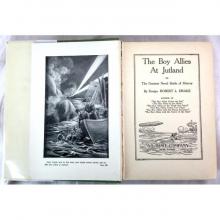 The Boy Allies with the Terror of the Seas; Or, The Last Shot of Submarine D-16
The Boy Allies with the Terror of the Seas; Or, The Last Shot of Submarine D-16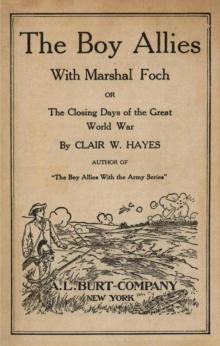 The Boy Allies on the North Sea Patrol
The Boy Allies on the North Sea Patrol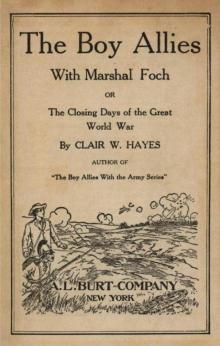 The Boy Allies in the Baltic; Or, Through Fields of Ice to Aid the Czar
The Boy Allies in the Baltic; Or, Through Fields of Ice to Aid the Czar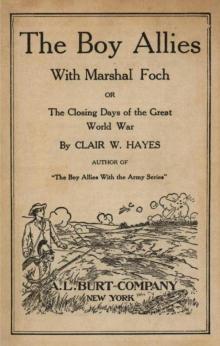 The Boy Allies with Marshal Foch; or, The Closing Days of the Great World War
The Boy Allies with Marshal Foch; or, The Closing Days of the Great World War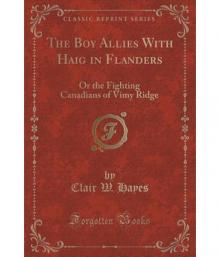 Boy Allies with Haig in Flanders; Or, the Fighting Canadians of Vimy Ridge
Boy Allies with Haig in Flanders; Or, the Fighting Canadians of Vimy Ridge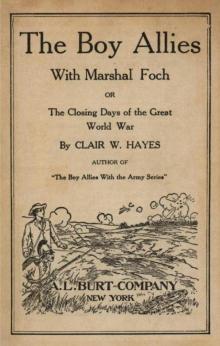 Boy Allies with the Victorious Fleets; Or, The Fall of the German Navy
Boy Allies with the Victorious Fleets; Or, The Fall of the German Navy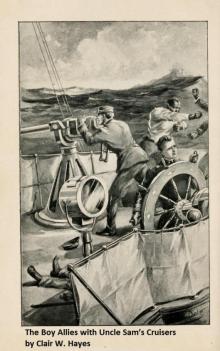 Boy Allies with Uncle Sam's Cruisers
Boy Allies with Uncle Sam's Cruisers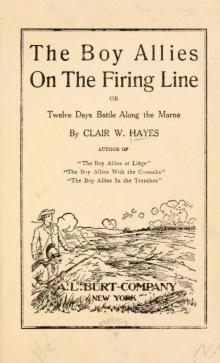 Boy Allies at Liège; Or, Through Lines of Steel
Boy Allies at Liège; Or, Through Lines of Steel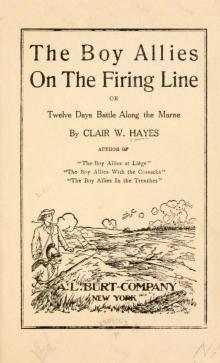 Boy Allies on the Firing Line; Or, Twelve Days Battle Along the Marne
Boy Allies on the Firing Line; Or, Twelve Days Battle Along the Marne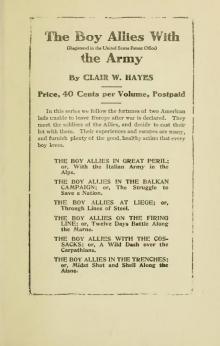 Boy Allies in the Balkan Campaign; Or, the Struggle to Save a Nation
Boy Allies in the Balkan Campaign; Or, the Struggle to Save a Nation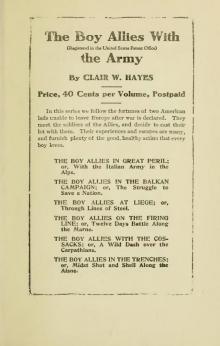 Boy Allies in the Trenches; Or, Midst Shot and Shell Along the Aisne
Boy Allies in the Trenches; Or, Midst Shot and Shell Along the Aisne Boy Artist.
Boy Artist.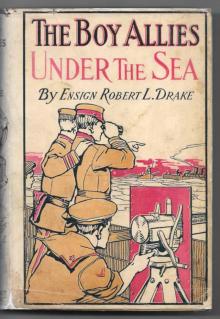 Boy Allies Under the Sea; Or, The Vanishing Submarines
Boy Allies Under the Sea; Or, The Vanishing Submarines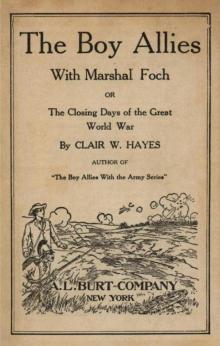 Boy Allies under Two Flags
Boy Allies under Two Flags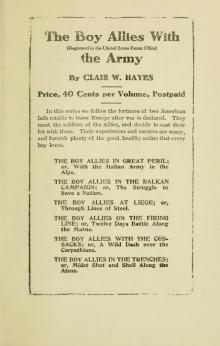 Boy Allies in Great Peril; Or, With the Italian Army in the Alps
Boy Allies in Great Peril; Or, With the Italian Army in the Alps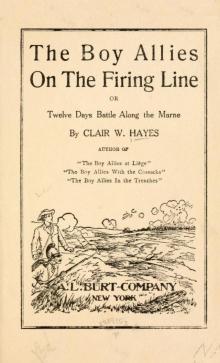 Boy Allies with the Cossacks; Or, A Wild Dash over the Carpathians
Boy Allies with the Cossacks; Or, A Wild Dash over the Carpathians